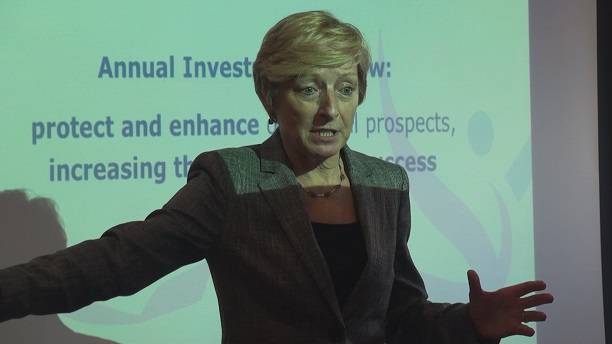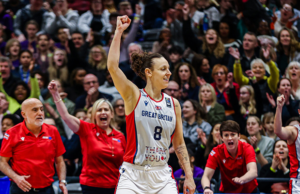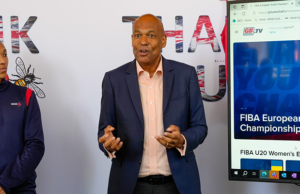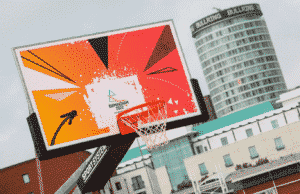UK Sport Answer Questions Regarding British Basketball Funding Cut

After the press conference to announce UK Sport has withdrawn funding from British Basketball on Tuesday afternoon, UK Sport CEO, Liz Nicholl (pictured above), and Board Chairman, Rod Carr, opened it up to the floor for questions from members of the media; the vast majority of the discussion was around basketball. What follows is a transcription of the basketball related questions (as well as some from my own one on one with Nicholl), that may shed more light on the reasons why they came to their decision.
Reporter: Last year basketball and wheelchair fencing successfully appealed; the plan that they gave you to say we can medal in 2020, are they still on course for what they’ve promised and you’ve moved the goalposts or have they failed to deliver what they said they would?
Liz Nicholl: You know basketball men and women did not meet their milestone target event for last year. Our view of basketball is that they have a very good support team, they have a very good leadership team working with the sport.
They are always going to be limited in what they can realistically do to deliver medal potential in a sport that has got a very good programme but that programme is only able to engage with athletes for a limited number of weeks in the year because they are playing with professional clubs. So the journey from where they are to where they need to get to to realise their medal potential in Tokyo is off track.
When they came back to appeal last year and made their representation to our board, they brought new information which said that, in fact, the draw for Eurobasket has been made and they were in a really strong position to be able to get to the top 6 in order to qualify for the Worlds. That was their milestone target, and they missed it; they didn’t deliver it.
So even though they had a favourable draw they still didn’t deliver the milestone target. It’s further information about the trajectory and other nations have never done it from where we are now. The biggest issue is the limited amount of time that the sport is able to access its athletes for.
Reporter: The NBA have got ambitions to set up a franchise here, they sold out the O2, the commissioner says he is still working on making basketball bigger here, yet you’ve withdrawn all funding.
Liz Nicholl: Basketball can still be a big sport in the UK, but not necessarily through GB team success. Don’t forget we’re investing in GB team medal success, we’re not investing in anything else.
The other home nations are investing in increasing participation and there’s still significant investment going in across the piece which we are delighted about.
Reporter: Will all seven sports be able to make representations to appeal?
Liz Nicholl: Yes they will.
Reporter: How long can they appeal for, a month like last time?
Liz Nicholl: The first step in the appeal process, we give them an opportunity to come make a representation to our board, which is not a formal appeal. That’s the chanse they have to make a case; is there something we’ve missed in terms of our performance assessment of their potential, and our board will reconsider it, we will thoroughly review whatever information they provide to us in addition.
Beyond that, they can go to formal appeal, through Sport Resolutions UK, which is an independent appeal process which we have agreed as a policy here at UK Sport. That’s much more about the process. Has the process been applied fairly, have they been disadvantaged through the process.
Rod Carr: Or in fact new evidence, so just as the case you made with basketball last year; there was new evidence. We try and be really reasonable; because we want to support winners we want to support teams that qualify, that’s what we want to do. We’re not standing here being hatchet men, trying to save money, or anything like that, so if anybody came because they thought the process was flawed or they were bringing evidence, we’re all ears.
Reporter: How can you encourage the sport in the country at participation level when there’s no heroes or national team for them to aspire to be?
Liz Nicholl: The inspiration of success is only one element of the portfolio of things that can inspire youngsters to participate. I think basketball has a lot of basic things going for it, as an exciting sport that is easily accessible in local communities. We haven’t had British success so far so there’s not going to be any…(Carr interjects)
Rod Carr: You could bring that argument to 44 Olympic and Paralympic sports and then we’d have to fund all of them on the basis of what you just said, which is simply unaffordable, and if we did that we’d compromise our support to our medal winning targets.
Reporter: But basketball is a major sport, it’s a massive sport in America and they are trying to invest over here, and it’s not just “another sport”
Liz Nicholl: But our criteria is very clear, we’re not looking at how many people are participating in this sport, or what’s the potential for increasing it; that’s a different investment that the home nation is responsible for. Sport England particularly put in a lot of money for basketball to increase participation. That’s not part of our focus, not part of our investment principles, we are purely investing in elite success; that’s our remit.
Reporter: British Basketball performance director has said “what price a legacy for 2012” what would you say to that?
Liz Nicholl: These sports all had a unique opportunity to profile their sport in London. We always knew that the biggest legacy of London 2012 for the sports without medal potential was to showcase their sport and encourage individuals to actually then increase their participation. They still had that platform to showcase their sport, and they’ve still got the opportunity to grow their participation base.
I would actually say to some of the sports that are actualy in this category, that you concentrate on growing your participation, grow your national participation base, grow your national competitive structure, grow your talent nationally and make sure you’ve got a great national competitive structure before you think you can take on the world.
Rod Carr: And a good example of that is gymnastics, which were in this similar situation at the end of the 1990s, and basically regrouped and came on a journey, took 12 years, and won 3 medals at 2012. It’s not true to say that just because we don’t invest, that that’s it. In fact there are methods to go back and regroup to move the sport forward, and it’s been done.
Reporter: How did they take the news, basketball, and do you expect them to launch an appeal?
Liz Nicholl: Basketball, and all the sports that received the news this morning would’ve been devastated, really disappointed, as you would be in their shoes. We don’t know yet, there’s a point in which they have to let us know whether they want to come and make representation to our board, and then there’s a further point when they will have to decide whether they want to go to formal appeal.
I think we can expect basketball to do that, because they did it last time successfully, so it makes sense, if I were in their shoes, to do it again.
Reporter: Is there an issue with th governance in basketball, the NBA said there was an issue that there was no leadership in basketball from a distance.
Liz Nicholl: From our perspective, basketball has been really well managed.
Reporter: The overall pot of money is that still exactly the same, and you’ve just redirected it?
Liz Nicholl: I spoke about 18 sports having their funding increased, so the funding that we’ve reduced has resourced the funding increase. And of course we still hold a resource for the annual reviews that might remain over this period.
Reporter: Do you think you made a mistake last year in giving as much money to the sports that you’ve now decided don’t warrant it, in hindsight?
Liz Nicholl: No, I think what we did last year is we gave the sports another chance to prove to us whether they could acutally show to us in the last year through their performances and their milestone target events, which were targets agreed with them, that’s what they said they could deliver, we gave them a chance to show what they could do.
Rod Carr: It’s a no excuse environment. We realise sport is sport it can (shakes hand) on the day and all the rest of it, but we gave them the benefit of the doubt, we invested, yet still after another year, post-2012, they weren’t able to meet THEIR mutually agreed targets.
Reporter: Rod (former CEO of Sailing), sailing has got a pretty hefty increase and obviously you’ve come from sailing, can you discuss the chat about sailing’s near 1 million pound increase.
Liz Nicholl: Rob was excluded from all discussions about sailing as you’d expect quite right and proper. He didn’t know anything about the detail of what sailing requested and all the other informations. The deputy chair of the board took over at that point in time.
With all our board members, if they’ve had any association with any sport, no matter how recent, they step away from any discussions affecting that sport.
Reporter: And it’s the age old argument that there are sports with very few medals available in, like basketball, or there are sports with a glut of medals like swimming, cycling or whatever, do you still feel it’s right to judge every sport in the same way and not to actually make special cases for team sports in particular, where it just seems to be a lot tougher for us to medal?
Liz Nicholl: We treat every sport the same, every medal is important to us. You know we’re funding hockey, men and women, that’s really costly, you could say it’s two medals, but we view it as 16 medallists per squad. We treat every sport equally and our investment decisions our unapologetically based on the meritocratic table and how far they are away from the podium.
So if all that bunch of team sports were right at the top then the outcome would be we’d fund fewer sports in total because of the resource that we’ve got but we’d still fund them. We would take that meritocratic approach, we must do that, take that meritocratic approach. It’s unfortunate that it’s some of the team sports that fall into this category, but whether it was one medal that they had the opportunity to go for, or six medals that they had the opportunity for go for, doesn’t come into it, it’s whether they have the potential to deliver, that’s the judgement call that we make.
Hoopsfix: What do British Basketball need to do now, to regain funding in the future?
Liz Nicholl: Well, if basketball think that we’ve actually missed something significant in terms of our assessment of their medal potential, then they have the opportunity to come back to the table and ask for representation directly to our board. They can then also appeal the decision; basketball went through this process last year, so they know their way through that very well.
If that is not successful, then I think the sport probably has to regroup and really think about what it wants to achieve at an international level and how it might really work together to further develop the participation base in the UK, the talent base in the UK, the competition structure in the UK, so that in fact our basketball players here can develop their talent and prove their potential for future athletes.
Hoopsfix: You said that one of the biggest barriers is the fact that so many players are based abroad so that British Basketball don’t have the time to spend to develop them, but France has exactly the same issue and they’re medal contenders every single year.
Liz Nicholl: We’ve done some work to look at where the British team is now and which countries around the world have moved from where they are now to medal potential within this period we have, from Rio onto Tokyo. There are very few countries that have ever done that.
One of the limitations, as you are aware, is a very good British programme has limited access to those athletes. What the indications are is that there isn’t sufficient time to develop the team to a standard where it can perform in the major competitions to give us confidence it can make this journey through to medal potential in Tokyo.
Hoopsfix: Would you say that British Basketball could have spent the money they received better on other things, so they were in a better position now?
Liz Nicholl: I wouldn’t say that. I think British Basketball have done as much as they possibly could have done, but there are some significant limitations in terms of access to athletes.
Hoopsfix: And they’ve got to work that out for themselves, how to overcome those, to reassess things in the future?
Liz Nicholl: Yes, absolutely, that’s a matter for the sport, that’s not something that UK Sport can influence.
Hoopsfix: If the appeal isn’t successful, the next time it can be looked at by UK Sport is for the next cycle after 2016?
Liz Nicholl: No, we have an annual review. Every year we will look to see if anything significant has changed in the landscape, has the potential in any of our sports changed in any way.
We will review sports that are currently funded, to see whether in fact their potential has reduced, and sports that we’re not funding to see whether their potential has increased. So the door is open for us to look at that every year.
Hoopsfix: So ultimately, you would love to see success at EuroBasket over the next couple of years for British Basketball to then open the door for potential funding in the future?
Liz Nicholl: Yes, absolutely. If the sport is going to do well on the Olympic stage, it first has to do incredibly well on the EuroBasket stage.
Thoughts?






Pingback: Joel Freeland Remains Loyal to Country Despite GB Absence — Hoopsfix.com